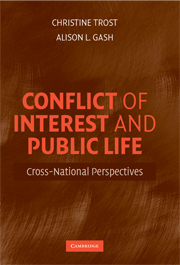Book contents
- Frontmatter
- Contents
- About the Contributors
- Acknowledgments
- Conflict of Interest and Public Life
- Introduction
- PART I THEORETICAL FRAMEWORKS
- ONE Legal Standards and Ethical Norms: Defining the Limits of Conflicts Regulations
- TWO The Watergate Effect: Or, Why Is the Ethics Bar Constantly Rising?
- THREE Pluralists and Republicans, Rules and Standards: Conflicts of Interest and the California Experience
- FOUR A Democratized Conception of Political Ethics
- PART II CROSS-NATIONAL CASE STUDIES
- Bibliography
- Index
TWO - The Watergate Effect: Or, Why Is the Ethics Bar Constantly Rising?
Published online by Cambridge University Press: 31 October 2009
- Frontmatter
- Contents
- About the Contributors
- Acknowledgments
- Conflict of Interest and Public Life
- Introduction
- PART I THEORETICAL FRAMEWORKS
- ONE Legal Standards and Ethical Norms: Defining the Limits of Conflicts Regulations
- TWO The Watergate Effect: Or, Why Is the Ethics Bar Constantly Rising?
- THREE Pluralists and Republicans, Rules and Standards: Conflicts of Interest and the California Experience
- FOUR A Democratized Conception of Political Ethics
- PART II CROSS-NATIONAL CASE STUDIES
- Bibliography
- Index
Summary
This chapter begins with a paradox. In most of the “old” democracies, there has been in the past years growing concern about the ethics of public officials. But at the same time, empirical evidence of unethical behavior in the political sphere does not suggest an increase. As a former Canadian Ethics Counsellor has argued, the “ethics bar,” in terms of rules and standards of conduct, is “constantly rising,” but “in the real life,” instances of “ethical lapses are relatively uncommon” (Wilson 2002, 2). In his Ethics in Congress, Dennis Thompson (1995) similarly noted that even if there is “escalating concern about ethics” in Washington, “there is no evidence that the character of members in recent Congress is worse than their predecessors … it may indeed be better” (3–4). A study published in 2002 by the Brookings Institution comes to the same conclusion: “Worry about the ethics of public officials greatly exceeds formal evidence of ethical violations” (Mackenzie 2002, 98). In many countries, the last decade or so has witnessed the steady accumulation of ethics regulations and the expansion in strength and scope of organizations involved in enforcing standards of conduct in public life (Gay 2002). This raises the question: Why is the ethics bar constantly rising?
The literature on public ethics in political science, which is mostly atheoretical and normative, offers little guidance when attempting to answer this question. Much of the scholarly focus on political ethics can be broadly divided into two perspectives.
- Type
- Chapter
- Information
- Conflict of Interest and Public LifeCross-National Perspectives, pp. 35 - 55Publisher: Cambridge University PressPrint publication year: 2008
- 2
- Cited by



